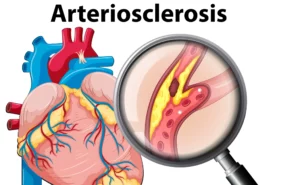 Atherosclerosis, often referred to as the “silent killer,” is a progressive cardiovascular disease characterized by the accumulation of plaque within arteries.
Atherosclerosis, often referred to as the “silent killer,” is a progressive cardiovascular disease characterized by the accumulation of plaque within arteries.
This narrowing and hardening of arteries can eventually lead to serious complications like heart attacks and strokes. While genetics play a role, lifestyle choices also significantly impact the development of atherosclerosis.
Let’s explore some of the primary risk factors that contribute to this concerning health issue.
Unhealthy Diet
The foods we consume have a profound impact on our cardiovascular health. Diets high in saturated and trans fats, cholesterol, and sodium can contribute to the buildup of plaque in arteries.
Processed foods, sugary snacks, and excessive red meat consumption are associated with higher levels of bad cholesterol (LDL) and lower levels of good cholesterol (HDL), increasing the risk of atherosclerosis.
Smoking
It is a major culprit in the development of atherosclerosis. The chemicals in tobacco smoke damage blood vessels, triggering inflammation and reducing the ability of arteries to dilate.
Moreover, smoking contributes to the formation of blood clots, further restricting blood flow and promoting plaque buildup.
Physical Inactivity
A sedentary lifestyle is linked to a higher risk of atherosclerosis. Regular physical activity helps control weight, lower blood pressure, and improve cholesterol levels. Exercise promotes better blood circulation, reducing the likelihood of plaque formation.
High Blood Pressure
Elevated blood pressure damages the inner lining of arteries, making them more susceptible to plaque accumulation. Over time, the constant pressure weakens arterial walls, increasing the risk of complications like aneurysms and blood vessel ruptures.
Diabetes
Diabetes can significantly increase the risk of atherosclerosis. High blood sugar levels can damage blood vessels and promote inflammation, accelerating the development of plaque. Individuals with diabetes are also more likely to have additional risk factors like high blood pressure and obesity.
Obesity
Excess body weight, especially abdominal fat, is linked to inflammation and insulin resistance. These factors contribute to the development of atherosclerosis. Obesity can also disrupt the balance of hormones involved in regulating metabolism and blood pressure.
Genetics and Family History
While lifestyle choices play a substantial role, genetic predisposition cannot be ignored. Individuals with a family history of heart disease and atherosclerosis are at a higher risk, as genetic factors can influence cholesterol metabolism and arterial function.
Stress
Chronic stress can lead to behaviors like overeating, smoking, and physical inactivity, all of which are risk factors for atherosclerosis. Moreover, stress triggers the release of hormones that contribute to inflammation and blood vessel damage.
Picture Credit: Freepik
